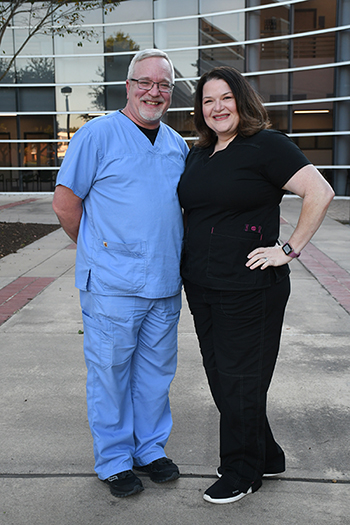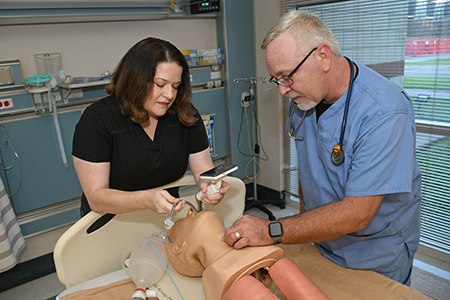Teri and John Posey: Teammates from marriage to education to career
While the world may have been shutting down, Teri and John Posey's work was ramping up.
Nothing showed the importance of clear airways as much as a global respiratory virus, and the two respiratory care therapists suddenly found themselves the most essential health care team members.
"There's always been a running joke in respiratory care that no one knows who we are," Teri said. "Now everyone knows, which is great, but we're also relied on more."
Family first
Teri and John pursued San Jacinto College's respiratory care program long before COVID-19 became a household word. Although the wife and husband started in different cohorts — 2003 and 2005 — they both enrolled because of family.
For Teri, it was their son, hospitalized with breathing problems at 2 months old. The respiratory therapist who guided them through the uncertainty turned out to be a San Jac instructor. Ten years later, Teri left her full-time bookstore job to enroll in the full-time respiratory care program.
For John, the catalyst was losing his mother to chronic obstructive pulmonary disease. Although she struggled with a lung capacity of only 18%, he and his family had underestimated her condition.
"We didn't give my mom as much support as we could have," he said. "We just didn't get it. After Teri started taking the program, the picture started to color itself. I wasn't going to let that happen to someone else."
Open-door policy
The respiratory care program exceeded their expectations. Instead of just lecturing, instructors drew diagrams and shared stories to explain concepts. Coming from the construction industry, John had pictured a "sink or swim" environment.
"Instead, the two full-time instructors always had their doors open," he said. "They would work with you one on one."
Of course, John had one advantage over his wife: He had already tackled the material as her homework helper two years earlier.
"After she graduated, I felt like I'd earned the degree already," he said, laughing. "I had to go to school to make it official."
COVID-19 care
Now Teri is a team lead at Memorial Hermann Southeast, taking care of patients and assigning tasks to 13 other therapists. John works in long-term care at Clear Lake's Kindred Hospital.
Although normally seeing everyone from the preemie and the asthmatic to the post-surgery patient, Teri focuses on COVID-19 patients now. She works extra shifts to keep up with the demand and deals with tragedy alongside success almost daily.
"We know we've done the best we can, and it may not be a good outcome," she said. "Some cases are mild. Some are severe. That plays with your head sometimes."
John, on the other hand, spends more time with family members of end-of-life patients. While he has dropped no-filter construction talk for a compassionate bedside manner, patients' families can trust him to be direct.
"I've spent the better part of my career educating patients and family members on things I wish I could have been educated on during my mom's worst times," he said.
Root of it all
Today, there are plenty of days the Poseys finish shifts exhausted. Self-care might mean venting together, walking the dog, hugging their kids, or gliding a kayak along the bayou. Despite their profession's current challenges, they value their roots.
The College's respiratory care program allowed them not only to provide a better life for their family but also to make a difference for many families in crisis now. Teri sums up their San Jac experience with one word: grateful.
"We would not be where we are today without San Jac, because of the people who were put in our path," she said.
Like Parents, Like Kids
What started with the Poseys has extended to their three children. Their son, Mack, received EKG training at San Jac and is eyeing the Cybersecurity program. Now an elementary teacher, their middle daughter, Katie, transferred to the University of Houston after taking education classes at San Jac. And their youngest, Kayla, is pursuing the culinary arts program.
"We love eating her homework!" Teri said.


